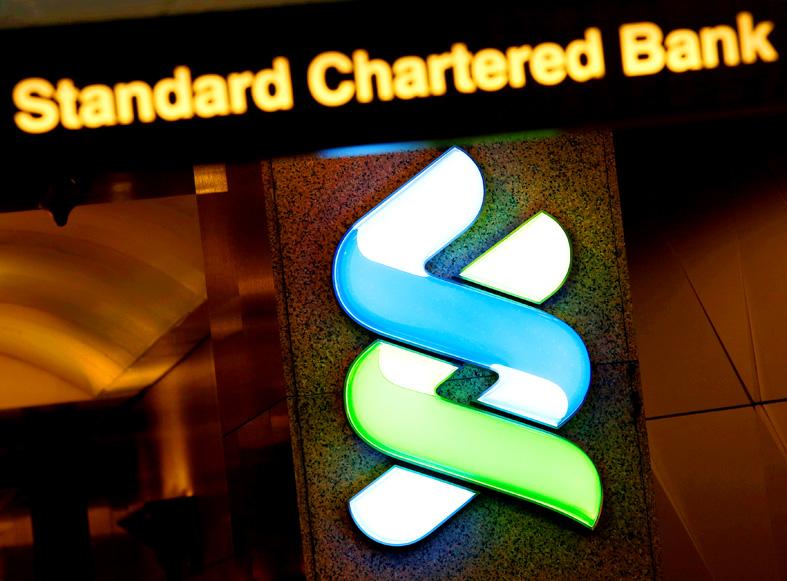Standard Chartered Bank (Taiwan) Ltd (渣打國際商業銀行) on Friday approved a sustainability-linked loan (SLL) worth US$505 million to ASE Group (日月光集團), the first such loan granted by the bank in Taiwan.
The transaction is not only the largest SLL in Taiwan this year, but also the world’s first such loan granted to the semiconductor packaging and testing industry.
Standard Chartered said that it would evaluate the related sustainability indicators of ASE Group over the two-year period of the loan, especially those concerning greenhouse gas emissions and the three benchmarks of the Dow Jones Sustainability Indices (DJSI).

Photo: Reuters
Standard Chartered said it would provide preferential interest rates if the company’s sustainability targets are met, a move that encourages the implementation of sustainable practices.
Connie Chu (朱佳玲), head of corporate, institutional and commercial banking at Standard Chartered Taiwan, said sustainable development is not only part of the bank’s financial services, but also its core culture.
The bank looks forward to playing a key role in the financial industry to assist customers in promoting sustainability goals, Chu said.
Standard Chartered also expects to call on more companies to pay attention to environmental, social and governance issues, she said.
Standard Chartered believes that sustainable development requires long-term investment, Chu said.
The bank looks forward to further deepening the long-term partnership with ASE Group beyond the two-year loan, and working together for the sustainable development of Taiwan, she added.
ASE Group is a world-leading semiconductor packaging and testing company and also a benchmark enterprise in Taiwan in terms of sustainable development performance.
The company has been named an industry leader in the semiconductor and semiconductor equipment industry group for five years in a row by the DJSI. It has also received the RobecoSAM gold award in the sustainability yearbook for three consecutive years.
With its contribution to saving energy and sustainability, it has achieved an “A” listing in the global carbon disclosure project for four years in a row, the only publicly listed company in Taiwan to make the prestigious list.
ASE Group has been active in introducing green supply chains and investing in renewable energy projects. It has joined the Science Based Targets initiative, and in July became the first chip company in Taiwan to set science-based emissions reduction targets, demonstrating an approach in line with international sustainability trends.
The group is a founding member of the Taiwan Alliance of Net Zero Emission. ASE aims to achieve 100 percent net-zero emissions at its offices by 2030, and at its local production sites by 2050.
ASE Group said the SLL transaction with Standard Chartered is its first sustainable concept loan, which further demonstrates the group’s commitment to progress in sustainable development.

Semiconductor shares in China surged yesterday after Reuters reported the US had ordered chipmaking giant Taiwan Semiconductor Manufacturing Co (TSMC, 台積電) to halt shipments of advanced chips to Chinese customers, which investors believe could accelerate Beijing’s self-reliance efforts. TSMC yesterday started to suspend shipments of certain sophisticated chips to some Chinese clients after receiving a letter from the US Department of Commerce imposing export restrictions on those products, Reuters reported on Sunday, citing an unnamed source. The US imposed export restrictions on TSMC’s 7-nanometer or more advanced designs, Reuters reported. Investors figured that would encourage authorities to support China’s industry and bought shares

FLEXIBLE: Taiwan can develop its own ground station equipment, and has highly competitive manufacturers and suppliers with diversified production, the MOEA said The Ministry of Economic Affairs (MOEA) yesterday disputed reports that suppliers to US-based Space Exploration Technologies Corp (SpaceX) had been asked to move production out of Taiwan. Reuters had reported on Tuesday last week that Elon Musk-owned SpaceX had asked their manufacturers to produce outside of Taiwan given geopolitical risks and that at least one Taiwanese supplier had been pushed to relocate production to Vietnam. SpaceX’s requests place a renewed focus on the contentious relationship Musk has had with Taiwan, especially after he said last year that Taiwan is an “integral part” of China, sparking sharp criticism from Taiwanese authorities. The ministry said

US President Joe Biden’s administration is racing to complete CHIPS and Science Act agreements with companies such as Intel Corp and Samsung Electronics Co, aiming to shore up one of its signature initiatives before US president-elect Donald Trump enters the White House. The US Department of Commerce has allocated more than 90 percent of the US$39 billion in grants under the act, a landmark law enacted in 2022 designed to rebuild the domestic chip industry. However, the agency has only announced one binding agreement so far. The next two months would prove critical for more than 20 companies still in the process

CHANGING JAPAN: Nvidia-powered AI services over cellular networks ‘will result in an artificial intelligence grid that runs across Japan,’ Nvidia’s Jensen Huang said Softbank Group Corp would be the first to build a supercomputer with chips using Nvidia Corp’s new Blackwell design, a demonstration of the Japanese company’s ambitions to catch up on artificial intelligence (AI). The group’s telecom unit, Softbank Corp, plans to build Japan’s most powerful AI supercomputer to support local services, it said. That computer would be based on Nvidia’s DGX B200 product, which combines computer processors with so-called AI accelerator chips. A follow-up effort will feature Grace Blackwell, a more advanced version, the company said. The announcement indicates that Softbank Group, which until early 2019 owned 4.9 percent of Nvidia, has secured a